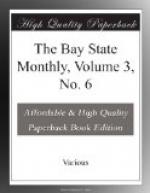One reason of Sam Adams’ prestige with the masses was his common and familiar intercourse with mechanics and artisans. Hancock, Otis, Bowdoin and Curtis, on account of their wealth and ideas of aristocracy, kept more or less aloof from the workmen; while Adams, plainly clad and with familiar but dignified manner, was often found in the ship yards or at the rope walks engaged in earnest conversation with the homely craftsmen. Indeed, nothing pleased him more than to be talking with a ship carpenter as they sat side by side on a block of oak, or with some shopkeeper in a sheltered fence corner. Most of his writing was done in a little room in his Purchase Street house where night after night his busy mind and quill were kept at work on his trenchant letters for the “Gazette,” which were signed with significant nom de plumes in Latin.
The year 1768 was made notable by the arrival in Boston from England of the 14th and the 29th regiments. The main guard was quartered in King (now State) Street, with the cannon pointed toward the State House, and the troops occupied various houses in the vicinity. In the next year the Governor, Bernard, was recalled, and Thomas Hutchinson, although remaining nominally lieutenant governor, became acting chief magistrate. He now appeared the most conspicuous figure among the royalists, and Samuel Adams became more distinctly the leader of the patriots. Neglecting all other affairs, he was content to live on a pittance, which he was enabled to do by a frugal and helpful wife.
Affairs were now approaching a crisis. A consignment of goods from England, sent in defiance of the non-importation agreements, was not allowed to land and had to be returned. One importer, a Scotchman, would not sign the agreements, so after much remonstrance, Samuel Adams arose in town meeting and grimly moved that the number present, about two thousand, should resolve itself into a committee of the whole, wait upon the obstinate merchant and use such persuasion as should be necessary to secure a compliance. But no vote was needed, for the Scotchman was present, and rushing to the front with knees trembling and in a squeaking voice, rolling his r’s like a well-played drum, exclaimed:— “Mr. Mode-r-r-rater, I agr-r-ree, I agr-r-ree!” greatly to the amusement of the people.
It was early in the next year, 1770, that the hostility between towns-people and soldiers led for the first time to the shedding of blood. In February a boy, Christopher Snyder, was shot and killed during a disturbance, and in March occurred the “Boston Massacre.” The story has been many times told. Quarrels had grown frequent between the soldiers and the rope-walk hands, the soldiers usually getting the worst of it. On the evening of the 5th, an altercation began just below the Old State House, between the sentinel of the guard and a crowd of townsfolk. An alarm was rung from one of the steeples, and many citizens hurried to the place,




